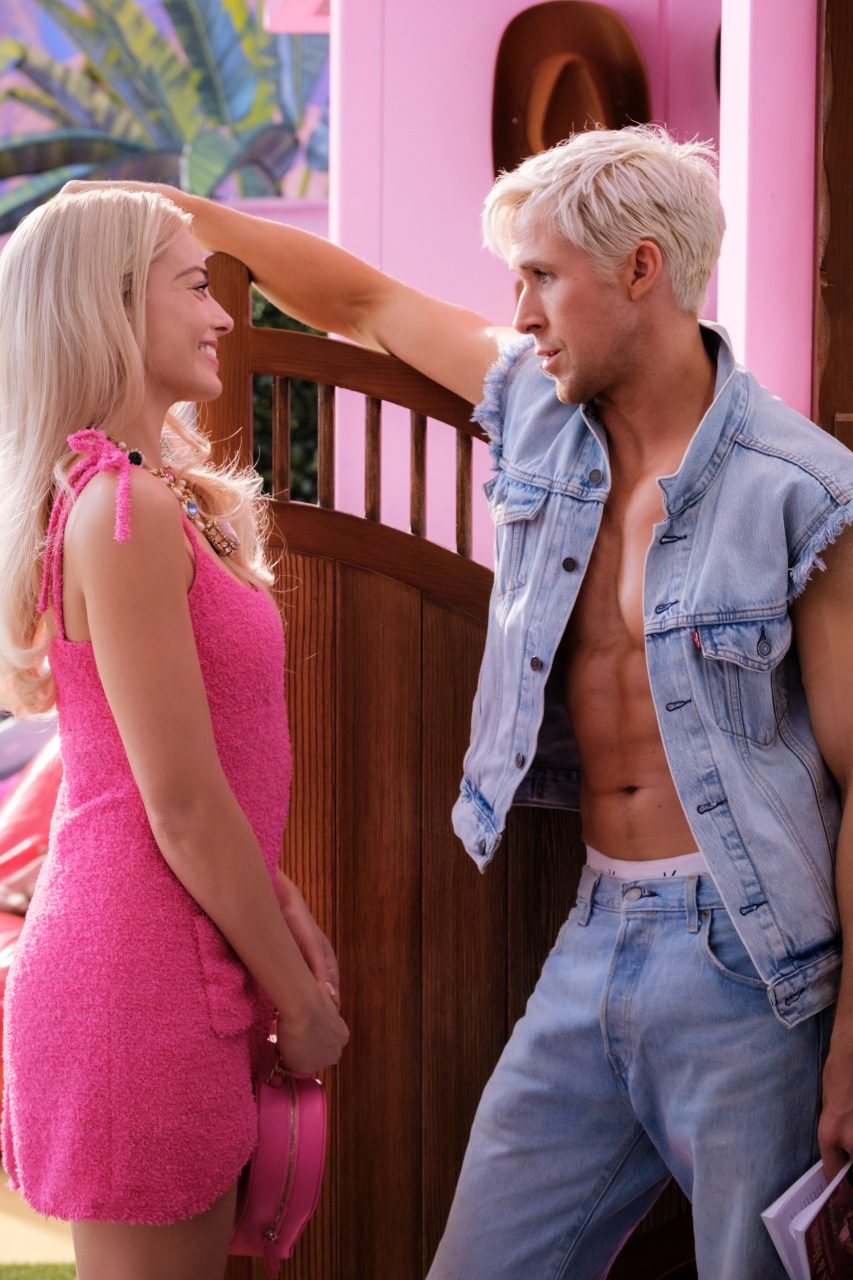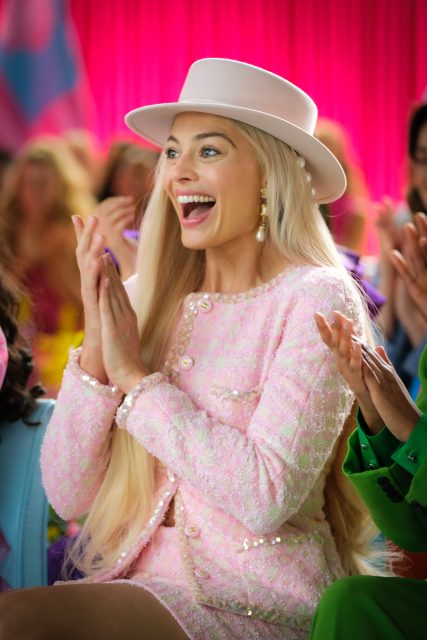Perhaps a big part of the continued excitement surrounding Greta Gerwig’s Barbie can be attributed to the pivotal role that Barbie played in so many of our lives. Some of my best memories as a child involved a heavy plastic box filled with Barbie dolls, each one’s hair increasingly matted and tangled with wear despite my best attempts at smoothing them out. Even now, with the plastic box long buried under a mounting pile of “More Important Things”, Barbie stays with me. There is Barbie in every word that I speak, from when I was cuddled up on the couch with my sister, improving my English by watching The Twelve Dancing Princesses or a different movie chosen from our towering stack of Barbie DVDs.
As a young girl yet to be made aware of the many biases and cruelties of the world, Barbie was not a thin, blonde doll that represented the impossible ideals we had to strive towards – Barbie was, quite simply, me. She was beautiful with her golden hair and blue eyes, just as I was beautiful with my black hair and dark brown eyes. She looked wonderful in her pink ball gowns and lab coats with a pink stethoscope hanging from her neck, just as I felt wonderful dreaming about becoming an inventor or a veterinarian in my princess dresses or denim overalls. She was confident in the same way that I was, and everything made sense: Barbie was joy, and I brought myself total, unbridled joy.
As I grew up, there was the inevitable “Barbie is actually really annoying and the worst character in every movie” arc. She took up space, in the way that I was slowly learning not to; she celebrated her successes without shame and received praise without instinctive denial, while I had been conditioned to do anything but; and God forbid her unbearable “main character syndrome” – in a movie named after her and about her – because the right thing for her to do would be to feel impossibly guilty every time she said the word “I”.
Greta Gerwig’s Barbie, then, heals that inner child that was told to be quiet one too many times, that was told to shine her spotlight on someone else, that was told that women, regardless of her intelligence or success or beauty, must first and foremost be willing, agapeic background characters in their own lives. Barbie is about Barbie, and unapologetically, rightfully so. Without further ado, then, here are 25 thoughts that I had while watching the film.
1. Margot Robbie is perfect for the role.
(This one is entirely self-explanatory. I’d like to see anyone even try to disagree.)
With her blue eyes, full-pink get-up and luscious blonde locks, Margot Robbie looks like Stereotypical Barbie. More than once in the movie I caught myself simply entranced by how beautiful she is. Much more than that, however, she delivers a breathtaking performance, and you can trace every step of her progression from a two-dimensional doll to a woman with heart and humanity. She plays Barbie earnestly and sincerely, bringing the doll to life with an incisiveness that allows for the film to resonate so strongly with its audience. There is something about her performance that feels impossibly personal, like you are also feeling happiness or sadness for the first time with every heartfelt smile or every tear that Barbie sheds.
2. Ryan Gosling, I was wrong about you.
When Ryan Gosling was first announced as Ken, I admit that I had my doubts. While I had always known he was a funny guy, it so happened that I had only ever really seen him play charming, arrogant heartthrobs before, and I was not completely sold on his Ken-ergy. Well, I could not have been more wrong. Ryan Gosling is fantastic as Ken, with impeccable comedic timing and just the right amount of over-the-top attempts at smouldering and acting suave. He had the audience laughing out loud in the cinema more than once, delivering his lines immaculately every time.
3. Ken’s idol debut was something I never knew I needed.
Ken’s musical number is definitely one of many highlights in the film, and I thank whoever it was who decided to release the song ahead of time because it is glorious. My friends and I were sitting in our seats mouthing along to the words, and I can guarantee that we would be front row, lightsticks at the ready, if Ken were to ever throw a concert. (The song is unbelievably catchy, too. I’m just Ken… Anywhere else I’d be a ten…)
4. Did someone say Sex Education reunion?
Connor Swindell, Ncuti Gatwa and Emma Mackey all starred in the film, and it was especially cute when Ncuti Gatwa’s Ken said that he missed his friend, Emma Mackey’s Barbie. Speaking of which, when is the next season of Sex Education coming out?
5. “Hahahahaha!”
Onomatopoeia, for effect. I was laughing so much throughout the course of this movie. It is hardly surprising considering the talented cast, but every line was simply perfectly executed. A few favourites include: a) Helen Mirren interrupting as the narrator to say that they probably should not have casted Margot Robbie if they were going to make a joke about Barbie not feeling attractive; b) when Ken yells “Sublime!”; c) “does the phrase ‘long term long distance low commitment casual girlfriend’ mean nothing?!”.
6. This! Is! Gorgeous!
The cinematography of Barbie is simply flawless. The vibrant colours of Barbie Land match the gorgeous costumes of each individual Barbie, courtesy of Oscar-winning costume designer Jacqueline Durran. Say what you will, but you cannot deny that this movie is aesthetically perfect.
7. Emma Mackey and Margot Robbie really don’t look as similar as I thought.
Like many others, including Margot herself, I always thought the two actresses had a striking resemblance – until I saw them side-by-side on screen. Next to each other, they both look so distinctly and uniquely themselves, and really don’t look much alike at all.
8. “My job… is just ‘beach’.”
Perfected by Hari Nef’s brilliantly delivered response of, “And what a good job you do at ‘beach’.” This dialogue actually plays on repeat in my head every once in a while, totally unprompted. It’s just so fantastically executed. I laughed when I heard it in the trailer, I laughed in the cinema hearing it again, and I’m still laughing listening to it in my own head.
9. I don’t know if I’d say Barbie Land is an exact, matriarchal replica of our patriarchal reality.
Barbie is perhaps guilty of being overly dismissive of Ken, and her apology at the end of the movie is understandable and fitting. Similarly, the fact that Kens were created as Barbie’s accessory does strip them of an individual identity, and in that sense, reality and Barbie Land are paralleled in that there is a greater, institutionalised inequality at play in both worlds. I do not feel, however, that Barbie Land is intended as but an analogical reversal of our patriarchal world. Barbie never imposes herself onto Ken, never feels the need to put Ken down to assert her own superiority, never forces Ken into subjugation. Barbie just… doesn’t care, or at least not much. She fails to give Ken her attention, but never behaves in a way that actively represses or restricts him. The Barbies don’t attempt to dominate the Kens; they don’t “womansplain” the way the Kens do in the Kendom, nor do they force their interests onto the Kens. The Barbies simply do their own thing.
10. Watch me da-ance! Dance the night away!
If there’s one thing you can guarantee about any of Dua Lipa’s songs, it has to be that they are always so catchy! I have been “dancing the night away” on loop every single day since I walked out of the cinema. The choreographed dance routine is such a fun moment in the film.
11. Why isn’t that the Supreme Court?
When Barbie and Ken first arrive in the Real World and see the billboard of pageant models while rollerblading, Barbie exclaims something along the lines of “Look, it’s the Supreme Court!”. While a great moment comedically, I also love this line for what it tells us about how, to Barbie, a woman being beautiful or sexy and aware of her own beauty is not at all at odds with how intelligent or capable she is. To hell with the “dumb blonde”, hot-but-vapid-girl tropes — brains and beauty have never been mutually exclusive, and women can be and are both.
12. Barbie, you’re such a queen.
I appreciated Barbie’s completely unhesitant ability to defend herself. She is assertive in establishing her boundaries with Ken throughout, never once feeling the need to cushion her rejections of his advances with a polite and unthreatening laugh. When a man slaps her butt in the Real World, she instinctively punches him in the face, without needing to think twice about whether it would bring more trouble than it is worth. Barbie does all of these things because protecting and defending herself comes naturally to her. She has never had to push down these instincts, because it has never occurred to her that saying no or asserting your own boundaries may have fearful or violent consequences. Never having been confronted with reactionary violence, she never had to learn to fear it or to simply let such assault go without consequence.
13. The Real World indeed.
Whilst dramatised for the big screen, it is still disheartening but all too familiar that Barbie is continuously objectified in the Real World, even by supposedly morally upstanding police officers. Equally demoralising is the fact that even a self-proclaimed “feminist” corporation such as Mattel in the Real World fails to allocate any significant decision-making positions to women.
14. You are so beautiful.
This is one of my favourite scenes in the entire film, and I am so thankful that Greta kept this scene, which she called “the heart of the movie”, from being cut. It is so moving when Barbie, who has had no prior conception of ageing, sees an old woman for the first time. There is such genuine wonder and awe in her voice as she says “you are so beautiful” to the old woman, the two exchanging smiles of admiration. It is such a raw, heartfelt moment, when Barbie beholds the old woman in all her beauty and is immediately able to comprehend it, because she has never been taught to fear or demonise ageing.
15. How does Barbie’s hair look so good?
Someone please point me in the direction of how to get my blow-out looking that voluminous with such bouncy, big curls.
16. I love women.
It was beautiful finding out that Barbie was in the Real World not for Sasha, but for Gloria, to heal her inner child. In a different way, however, Barbie’s journey into the Real World ends up being for all three of these women, including herself. There is something so beautiful and powerful about women connecting with each other and allowing themselves to empower one another.
17. I want that outfit.
This thought essentially crossed my mind every time Margot Robbie was on screen, and understandably so. The best outfit in the entire movie, in my opinion, is the hot pink Chanel mini-dress she wears in the second half of the film. The dress is paired with a pink, heart-shaped vintage Chanel bag and a stunning diamond and gemstone Chanel necklace with hanging pear-shaped pearls and interlocking Cs, both from the Spring/Summer 1995 collection. I wish I was joking when I say I fell in love at first sight with that necklace.
18. “Mojo Dojo Casa House” as a phrase is crazy. I’m obsessed.
“Mojo Dojo Casa House” is, without a shadow of a doubt, one of the funniest, craziest things I’ve ever heard, and Ryan Gosling’s delivery is, of course, on point. Absolutely hilarious.
“Mojo Dojo Casa House”. My God.
19. Is that… That’s John Cena…?
John Cena’s cameo. Need I say more? Of all the things I was expecting, “John Cena in a blonde wig as Merman Ken while Dua Lipa flirts with him” was not on my list. I saw a picture of this moment before watching the movie, actually, but it felt so surreal that I assumed it was an edit. I was wrong.
20. Oh, Allan.
Allan. Oh, Allan. An unassuming, unthreatening male presence. Wouldn’t we all love to have an Allan in our lives?
21. This! This right here is exactly it. She has articulated it perfectly.
America Ferrera’s speech is the highlight of the film. I can recite it off by heart, but I won’t because nothing beats Ferrera’s delivery of it. It is incredibly moving, and I teared up at this bit, as I am sure a lot of others did, too. Every woman will feel her words resonate so viscerally, and you can tell Ferrera herself recognises them, too, more than just as words on a page or a fictional character’s frustrations, but as an unmistakably universal, female sentiment. All too often, women are forced onto an impossible tightrope of contradictory expectations, of being pleasant above being anything else that makes her distinctly herself. Everyone wants a woman to be something different, regardless of what she might want for herself. It’s not only the world that holds her to an impossible standard, either – it’s how she holds herself to it, because of the way society is structured not to accommodate her otherwise.
22. I agree, Ken. “Patriarchy” would be a lot more interesting if it was just about horses.
He may have brought patriarchy to Barbie Land, but I giggled when Ken admitted that he lost interest in patriarchy basically right after he realised it was not about horses. Like most comedic lines in the movie, there is a truth behind this joke that demands to be heard: patriarchy is harmful not only to women, but to men, too. Just as it attempts to force women into behaving a certain way, it also forces men to do the same. That’s why I love the conclusion of “he’s just Ken”. He is just Ken – and that’s Ken-ough. He neither has to impose himself onto Barbie, nor does he need to exist alongside Barbie at all times. Ken is just Ken, and that’s okay. More than okay, in fact, it makes sense. He does not have to be what Barbie or the patriarchy expect him to be – he only has to be himself.
23. I love you, Mum.
In the film, Ruth Handler, played by Rhea Pearlman, says that “we mothers stand still so our daughters can look back and see how far they’ve come.” Mothers are superhero figures to a lot of us, god-like in their apparent omnipotence and perpetually benevolent intentions. It is not until you get a bit older, more independent, and see your mother indulging in hobbies just for herself that you realise how little she used to do that before. The dynamic between Gloria and Sasha is a much-needed reminder, then, that your mum is not just your mum – she is also, simply, a girl. A girl, with flaws and ambitions and dreams, an idealised vision of how her life would turn out, who decided, one day, that she would plant her feet at least for a little while to have you.
24. I have chills.
Let’s be honest – everyone in the cinema shed a tear when “What Was I Made For” by Billie Eilish started filtering in through the speakers, and we were presented with a montage of home movies featuring real women. These women are made up of the loved ones of the cast and crew, some of whom are still around and some of whom have passed, each a glittering star in her own right, and Billie’s voice in the background is the constellation that ties it all together, this beautiful homage to people and to the galaxy that is womanhood. This scene is so impossibly personal, where strangers on screen seem to take on the familiar faces of the mothers or daughters in your own life, and it really encapsulates the innate human-ness that appeals to Barbie and stands at this movie’s core.
25. Who says this film is not for men?
Perhaps the biggest, most frustrating misconception about Barbie has been that this film is solely for women, when it is for everyone. The oppressive patriarchy forces its ideals on all of us, fits everyone into binaries that dictate how we should or should not behave, when the truth is, humanity is endlessly complex. We hold a complexity, both individually and together, that begs and deserves to be explored and embraced, rather than endlessly restricted by silly rules like “boys can’t cry” or “girls have to be mothers”. Ideas get to live forever, yet there is still something about the human experience that draws Barbie into choosing a finite, human path for herself when the option is presented to her, for it is humans that make these ideas — and it is only humans that can dismantle them.
The human experience, in its full, nuanced entirety, holds a wealth of possibility, each alluring and affirmative, with emotions and ambitions that should be welcomed rather than shunned, and the agency to decide your own identity and forge whatever path you want for yourself. Sure, maybe Barbie was never as big a part of your childhood as it was mine, but as long as you keep your mind open rather than dogmatically scrutinising for fault, it is glaringly obvious that there is a message of liberation in Barbie that applies to everyone.
Editor
Audrey MiuCredit
Lead Image via IMDb













